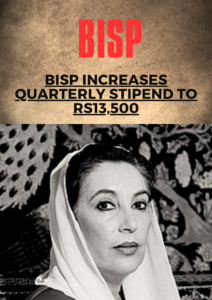BISP increases quarterly stipend to Rs13,500
Benazir Income Support Programme: A Lifeline for Pakistan’s Vulnerable
The Benazir Income Support Programme (BISP) has been a cornerstone of social welfare in Pakistan, aimed at providing financial assistance to the most vulnerable segments of society. Established in 2008, the program was designed to mitigate the effects of rising inflation and economic challenges on low-income families. Over the years, it has grown into one of the largest social safety nets in the country, playing a pivotal role in poverty alleviation and women’s empowerment.
Historical Background

and Objectives
The BISP was launched during the tenure of the Pakistan Peoples Party (PPP) government, under the leadership of then-Prime Minister Yousaf Raza Gillani. Named after the late Benazir Bhutto, the program’s primary objective was to provide direct financial support to women from impoverished households, thereby improving their living standards and empowering them economically.
The program’s core mission includes:
- Reducing poverty through cash transfers.
- Promoting gender equality by targeting women as primary beneficiaries.
- Supporting education and health outcomes through conditional cash transfer schemes.
Key Features of the Programme
Unconditional Cash Transfers
The BISP provides quarterly cash payments to eligible families. Initially, the amount was modest, but over time, it has been increased to reflect inflation and changing economic realities. The payments are primarily directed towards women, recognizing their critical role in household management and child welfare.
In a recent development, the BISP announced a 28.57 percent increase in its quarterly stipend for Kafaalat beneficiaries, raising the amount from Rs10,500 to Rs13,500. This decision was formalized during a ceremony at the BISP quarters, attended by Chairperson Rubina Khalid, Secretary Amer Ali Ahmad, and other senior officials. This increase follows last year’s hike, where the stipend was raised from Rs8,750 to Rs10,500 in January. Furthermore, BISP has pledged to expand the number of Kafaalat beneficiaries from 9.3 million to 10 million by the end of 2025.
Waseela-e-Taleem Programme
One of BISP’s standout initiatives is the Waseela-e-Taleem program, which incentivizes families to enroll their children in school. Under this scheme, additional financial support is provided to families, conditional upon children’s regular school attendance. This initiative aims to tackle the dual challenges of poverty and low literacy rates.
Digital Payment Mechanism
To ensure transparency and reduce the risk of corruption, BISP has implemented a digital payment system. Beneficiaries receive their payments through biometric verification at designated centers, mobile banking, or ATM cards. This shift towards digitization has significantly improved the program’s efficiency and credibility.
Budgetary Allocations
The BISP’s annual budget has seen significant increases over the years, reflecting the government’s commitment to social welfare. For the fiscal year 2024-25, the federal government allocated Rs598.71 billion, a 27 percent increase from the previous year’s budget of Rs471.23 billion. This increase became effective on July 1, 2024. Comparatively, the budget for the 2023-24 fiscal year initially showed a 10 percent rise from the 2022-23 fiscal year, moving from Rs408 billion to Rs450 billion. However, it was later revised upward to Rs471 billion, marking a 15.5 percent increase.
Impact on Society
Poverty Alleviation
BISP has been instrumental in providing a financial lifeline to millions of families living below the poverty line. By addressing their basic needs, the program has helped reduce the immediate hardships of poverty and improved the quality of life for countless individuals.
Women’s Empowerment
By designating women as the primary recipients of cash transfers, BISP has empowered them with greater financial autonomy. This empowerment has ripple effects, enabling women to play a more active role in household decision-making and improving their overall status in society.
Educational Outcomes
The Waseela-e-Taleem initiative has significantly increased school enrollment rates among children from low-income families. By reducing the financial burden of education, the program has opened doors to better opportunities for future generations.
Challenges and Criticism
While the BISP has achieved remarkable success, it has not been without challenges. Critics have pointed out issues such as:
- Targeting and Coverage: Ensuring that only the most deserving families benefit from the program remains a challenge. Instances of ineligible individuals receiving benefits have raised concerns about the accuracy of the program’s targeting mechanism.
- Sustainability: The program relies heavily on government funding and international aid, raising questions about its long-term sustainability.
- Political Interference: Like many welfare programs, BISP has faced allegations of political manipulation, with claims that funds have been distributed along partisan lines.
Future Directions
To enhance its effectiveness and address existing challenges, the BISP needs to focus on:
- Improved Targeting Mechanisms: Leveraging advanced data analytics and surveys can help ensure that only the most deserving families benefit from the program.
- Expanded Coverage: Increasing the program’s reach to include more vulnerable households, particularly in remote and underserved areas.
- Linking with Economic Opportunities: Integrating skill development and microfinance initiatives with BISP can help beneficiaries transition from dependency to self-sufficiency.
- Strengthening Accountability: Continued emphasis on transparency and accountability measures will further enhance public trust in the program.
Conclusion
The Benazir Income Support Programme has been a lifeline for millions of Pakistan’s most vulnerable citizens. Despite its challenges, the program’s impact on poverty alleviation, women’s empowerment, and educational outcomes is undeniable. With sustained efforts to address its shortcomings and expand its scope, BISP has the potential to serve as a model for social welfare programs across the globe. By investing in its people, Pakistan is laying the groundwork for a more inclusive and equitable society.